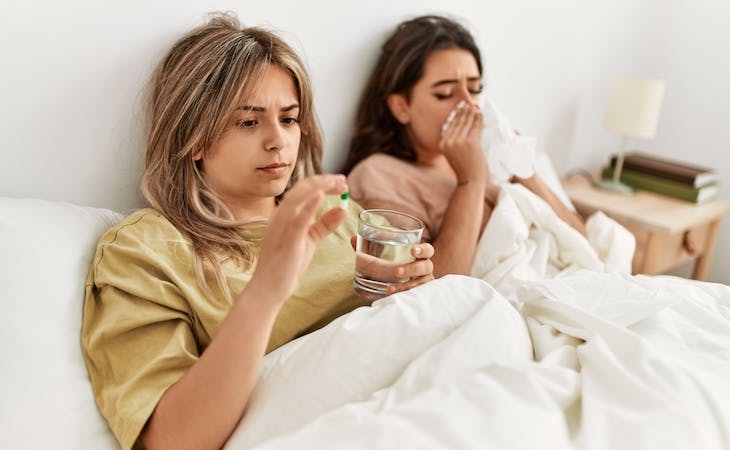Even if you take all the precautions to prevent getting sick, it can feel nearly impossible to avoid germs when your partner or roommate becomes ill. Viruses spread more easily in close quarters and you’ll have greater exposure since you live and sleep there too. [4]
But there are steps you can take to stay healthy even when others in your home aren’t. Read on to learn whether you should sleep in the same bed as your sick partner and what you can do to mitigate your risk of getting sick if you have to share a bedroom with someone who has COVID-19 or a cold or flu.
Sleep in separate rooms if possible
If you live in a studio or small one-bedroom apartment, it’s probably not realistic to sleep separately from your partner. But if you do have the space, experts say it’s best to sleep in another room when your bedmate is ill.
“It is possible to catch many different viral or bacterial infections while sleeping next to someone,” says Janice Johnston, MD, a family medicine specialist in Glendale, Ariz. “The infection is usually passed through someone’s cough or sneeze but can also be transmitted from their regular exhaled breaths while sleeping.”
And while it’s probably obvious, the other stuff you do in your bedroom like kissing and intimacy should also be avoided until your partner’s symptoms are gone since close contact can make it more likely for infection to spread [5].
If you’re unable to sleep separately from your sick partner, then “make sure your room has proper ventilation, sleep facing away from each other, and cover all coughs if possible,” Johnston advises. (Here’s how to help a sick child sleep better.)
Keep your bedroom windows open
Another step you can take to prevent illness while your partner or housemate is sick is to keep the windows open. [6]
“When considering respiratory viruses like the cold, flu, and COVID-19—or anything that spreads via droplets and aerosols— open windows can help as it will increase the number of air exchanges in a room and dilute microbes (germs) in the air shared between people,” explains Erica Susky, a certified infection control practitioner and instructor at IPAC Canada.
In other words, increasing airflow can help minimize the chances of the infection spreading, she says.
The Centers for Disease Control and Prevention (CDC) advises opening as many windows and doors as you safely can to allow better airflow, though even cracking a window open will help. [6]
Don’t share bedding or pillows
Airborne or droplet transmission aren’t the only ways illnesses can spread. [11]
“While sleeping, a sick person can transfer bacteria or virus onto their sheets through sweating and nasal dripping or saliva,” Johnston says.
These germs can live on surfaces for hours or days and spread through objects such as bedding, linens, and pillows to other people, notes Susky.
“Washing sheets with soap and hot water breaks this link in the chain of transmission by killing microbes that may remain on bedding,” she says. [7]
Bolster your immune system with a good night’s sleep
While you may be busy caring for your sick loved one, it’s important to prioritize your own health, including sleep. [3, 8, 9, 10]
“While sleeping, our bodies increase the production of a protein called cytokines, which is linked to reducing inflammation and infection, as well as improves the function of T Cells, the most important defense our bodies have against sickness,” Johnston says.
The immune system uses up a lot of energy—and good quality sleep can replenish those energy levels. [3, 8, 9, 10]
“This is the reason why people are tired and sleep more when sick,” Susky says. “The body is using a lot of energy when the immune system is actively fighting an infection.”
Adults should aim for at least seven hours of sleep or more each night, according to the CDC, but it wouldn’t hurt to get some extra shuteye to bolster your immune system even more. [12]
Sanitize surfaces in your bedroom
Like your bed linens and pillows, the surfaces in your bedroom and home can also be hotspots for viruses and bacteria. [1]
You’ll want to disinfect surfaces that have been touched by your sick partner regularly, advises Johnston.
Door knobs and handles, remote controls, and toothbrush holders are often overlooked but can be a hotbed for germs—so pay attention to these, as well as tables, countertops, and other surfaces your partner may have come in contact with. [2]
Since germs spread to and from these surfaces through touch, it’s also important to maintain good hand hygiene, with everyone in the household washing their hands thoroughly and often. [1,2]
FAQs
Can I get sick sleeping next to a sick person?
It’s possible to catch a cold, flu, or COVID-19 when sleeping in the same bed as someone who is sick. [4]
To mitigate your risk, you’ll want to sleep in another room (if possible), keep your home well ventilated by opening windows, and wash and disinfect bed linens, pillows, and commonly touched surfaces in your home. [2, 7]
It’s also important to wash your hands regularly and prioritize your sleep to bolster your immune system. [1]
References
- Lipinski T, Ahmad D, Serey N, Jouhara H. Review of ventilation strategies to reduce the risk of disease transmission in high occupancy buildings. International Journal of Thermofluids. 2020;7:100045. doi:10.1016/j.ijft.2020.100045
- CDC. When and How to Clean and Disinfect Your Home. https://www.cdc.gov/hygiene/cleaning/cleaning-your-home.html
- Besedovsky L, Lange T, Haack M. The Sleep-Immune Crosstalk in Health and Disease. Physiol Rev. 2019;99(3):1325-1380. doi:10.1152/physrev.00010.2018
- Louten J. Virus Transmission and Epidemiology. Essential Human Virology. 2016;71-92. doi:10.1016/B978-0-12-800947-5.00005-3
- Limeres Posse J, Diz Dios P, Scully C. Viral Diseases Transmissible by Kissing. Saliva Protection and Transmissible Diseases. 2017;53-92. doi:10.1016/B978-0-12-813681-2.00004-4
- CDC. Improving Ventilation in Your Home. https://www.cdc.gov/coronavirus/2019-ncov/prevent-getting-sick/improving-ventilation-home.html
- CDC. Appendix D – Linen and laundry management. https://www.cdc.gov/hai/prevent/resource-limited/laundry.html
- Imeri L, Opp MR. How (and why) the immune system makes us sleep. Nat Rev Neurosci. 2009;10(3):199-210. doi:10.1038/nrn2576
- Bryant PA, Trinder J, Curtis N. Sick and tired: Does sleep have a vital role in the immune system?. Nat Rev Immunol. 2004;4(6):457-467. doi:10.1038/nri1369
- Opp MR, Krueger JM. Sleep and immunity: A growing field with clinical impact. Brain Behav Immun. 2015;47:1-3. doi:10.1016/j.bbi.2015.03.011
- CDC. Lesson 1: Introduction to Epidemiology. https://www.cdc.gov/csels/dsepd/ss1978/lesson1/section10.html#:~:text=The%20mode%20of%20transmission%20can,the%20mouth%20or%20a%20syringe.
- CDC. How Much Sleep Do I Need? https://www.cdc.gov/sleep/about_sleep/how_much_sleep.html








